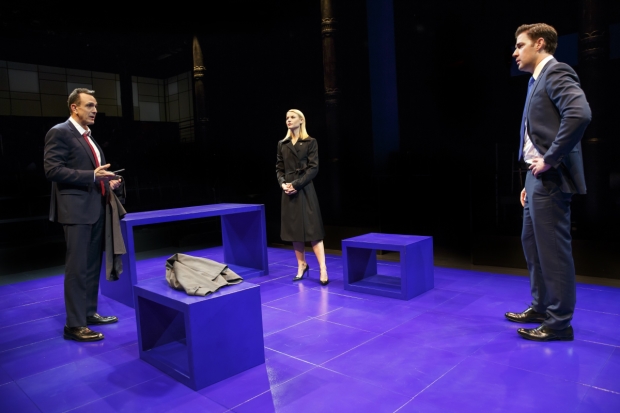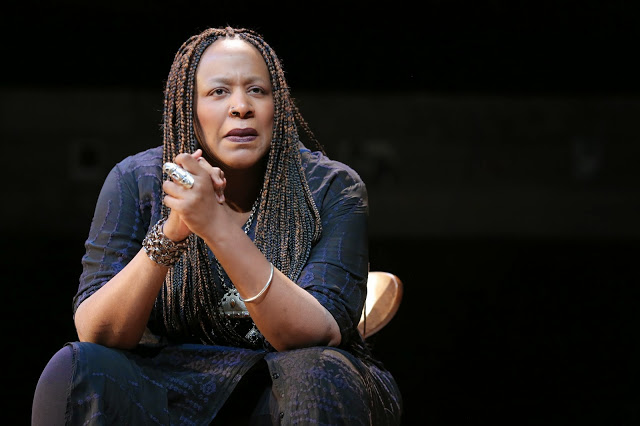by Carol Rocamora
With a recent flood of films on the corrupt state of America’s financial world (Wall Street, Inside Job, Margin Call, The Big Short), do we really need a new play on the topic as well?
The answer is unequivocally “yes”: if it’s a play with the urgency of Dry Powder, now being given an explosive production at the Public Theater.
Sarah Burgess’s eviscerating drama about wheeling and dealing in a private equity firm cuts deep into the gut – both ethically and emotionally. Everything is sharp-edged in Thomas Kail’s production – the angular scenes punctuated by sharp blackouts, the rectangular stage and furniture/props, the blinding neon lights that encircle the theatre walls, and the four characters themselves. (Even the stage hands wear corporate uniforms – dark suits, black dresses, high heels).
Here’s the story: Rick, the firm’s CEO, is having a tough week in his mid-town private equity firm. He’s had to enforce massive lay-offs – at the same time that he’s hosted a lavish engagement party for his daughter at his home in Bali (costing “a mill”, complete with elephants), an event that’s getting some pretty negative publicity.
Meanwhile, Seth, one of his minions, has brought in a potentially good deal for the firm at this perilous moment – the purchase of Landmark, a Sacramento-based luggage manufacturer owned by his friend, Jeff. So Rick must decide whether to proceed with the deal, and if so, how. He asks Seth and Jenny, another minion, to present opposing business plans. The issue at first is an ethical one – Seth’s plan will require no lay-offs to Landmark employees and no threat of company relocation. Jenny’s plan, on the other hand, will make more money for the firm, though it will require relocation of production to a foreign country. “My analysts do not love me,” she explains with steely conviction, “that’s how I know their numbers are real.”
As the conflict intensifies, ethical and moral considerations fall by the wayside. In order to cajole his friend into signing a letter of intent, Seth obfuscates the truth from Jeff – that his boss Rick is indeed considering an option that will lay off almost all Landmark’s 300 employees, to whom Jeff is deeply loyal. Meanwhile, Jeff – sensing the “bait and switch” – offers Seth a deal to come to work for Landmark, and find another buyer, thereby betraying Seth’s boss.
Ultimately, Rick sells his soul to an unethical Chinese investor that will enable him to buy Landmark. Seth complies, having a lifestyle (and a yacht) to maintain. As for Jenny, her only concern is for the bottom line. “Of course they’re protesting”, she says, shrugging off the disgruntled employees, “ that’s what unemployed people do.” Cornered by these three, Jeff makes an unexpected and shocking choice.
Under Thomas Kail’s meticulous direction, the impressive ensemble members deliver vivid and finely etched performances. Claire Danes (of Homeland fame) is mesmerizing as Jenny, a fierce financial warrior on the Asberger spectrum who slave-drives her team, works 24/7, and sleeps on the office floor. Hank Azaria’s Rick is a complex portrayal of a man fighting to survive at any cost, John Kasinski’s seemingly sincere Seth is a corporate chameleon, and Sanjit de Silva’s Jeff, the one humane character with some sense of ethics is – well, you’ll see…
Like David Mamet before her (American Buffalo, Glengarry Glen Ross, China Doll), Burgess has taken up a crusade against the corrupt American business ethics that threaten to bankrupt our society – spiritually as well as financially. Thanks to Burgess, words like “offshoring” (production relocation), “LOI” (letter of intent), and “dry powder” (liquid securities) are now currency in the theatre lexicon. Expect them to be around for a while.
Burgess frames her play effectively with a lecture that Jenny first rehearses and in the end delivers to a class of NYU business students. “You work in finance and you and I are not the villains of the story,” she tells them.
Who is, then?
Dry Powder, by Sarah Burgess, directed by Thomas Kail, at the Public Theater till
May 1, 445 Lafayette, New York, www.publictheater.org
Photos: Joan Marcus























